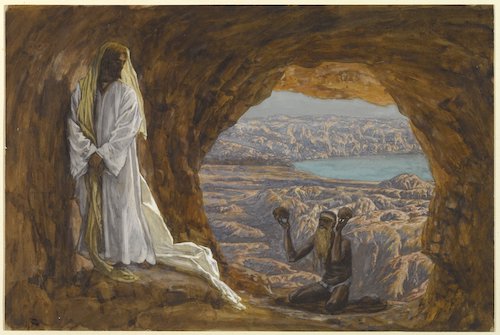
| entering the wilderness within |
| Let the mouth also fast from disgraceful speeches and railings. For what does it profit if we abstain from fish and fowl and yet bite and devour our brothers and sisters? The evil speaker eats the flesh of his brother and bites the body of his neighbor. Saint John Chrysostom, d. 407 And Jesus, full of the Holy Spirit, returned from the Jordan and was led about by the Spirit in the wilderness for forty days, being tempted by the devil. And He ate nothing during those days; and when they had ended, He became hungry’. (Luke 4:1-2) |
| It is the central teaching of the mystical Christian tradition that all that Jesus of Nazareth endured and preformed owns both a historical truth (it did transpire in Palestine 2000 years ago), as well as a profound message for our spiritual life (it will transpire within us now). The travails and triumphs of Jesus — as recorded in the Gospels — occurred to the Son of Man, and remain as the path, the way, for faithful Christians to transverse that they may also rise above this world, and give birth to the Christ Consciousness. After the dust of the New Year has settled and many of our resolutions have fallen by the wayside, we are offered a reprieve. The Lenten Season, the fasting season, begins year 2001 on the 28th of February with Ash Wednesday, and continues until Easter Sunday. It is a period of self-examination, repentance (from our fruitless ways), and anticipation (to behold the resurrected Christ). The forty days of Lent (minus the six Sundays that occur over the period) is modeled on the forty days in which Jesus withdrew to the wilderness, fasted, and confronted Satan.And immediately the Spirit impelled Him to go out into the wilderness. And He was in the wilderness forty days being tempted by Satan; and He was with the wild beasts, and the angels were ministering to Him.’ (Mark 1:12-13)The forty days in which Jesus wandered in the wilderness echoes Noah’s long days afloat when ‘the rain fell upon the earth for forty days and forty nights’ (Gen. 7:12). Moses, as well, ‘entered the midst of the cloud as he went up to the mountain; and Moses was on the mountain forty days and forty nights’ (Exod. 24:18). The earth was purified during Noah’s sojourn, and Moses was made ready to receive the Ten Commandments with his Mount Sinai encampment. These are ‘emptying processes’ where the old structures die away, that the new can be born. Artistic renditions of the wilderness experience of Jesus often place the event in a desert. Deserts are arid, quiet places where the senses (sight, hearing, taste, touch and smell) have little to encounter. The self is drawn within itself in environs offer little to pull man out. We read that Jesus fasted, but the fast is not only designed to starve the body, but to force all the elementals (desires, appetites, and wishes) within us to make themselves known. Starving the physical body is of value, only so long as the subtle bodies make their hungers known. Jesus said, ‘it is not what goes into the mouth that defiles a person, but it is what comes out of the mouth that defiles.… But what comes out of the mouth proceeds from the heart, and this is what defiles.” (Matt 15:1 + 15:18) The waking-self is suspended between two opposing forces: the nobility of the unified soul and the multifarious subconscious. The greater the territory the subconscious has in the self, the less room has the soul. C. G. Jung called the subconsciousness the ‘shadow’; Elementals, once created, have their own intelligence and desire. We have within the personality elementals that are primarily noetical [mental] in nature, and elementals that are more emotional in quality. The subconscious is where these elementals live, and from where they act on the personality. As the physical body needs nourishment to reconstitute itself, so do the emotional and noetical bodies need food (etheric vitality). Elementals, especially strong or group ones, need etheric vitality to live, and they drive the self to act in such a manner that they are well fed. Elementals are first created to serve the self, but when they fall out of our control the self then serves the elementals! The subconsciousness is basically emotional in nature, and until we learn, and control, the elementals in the self we will suffer. Dr. Stylianos Atteshlis (Daskalos), 1992 |
| The shadow or the egoism is a great and clever foe, which in the hustle and bustle of daily life finds plenty of opportunities to feed and recreate itself. Daily Introspection is perhaps the greatest and surest tool of unearthing egoism. But the seasons also support such important work. The Lenten time, the forty days before the Passion Week, is a perennial purification that cleans the self (ever more each year) that we can behold the beauty of creation, and emerge out of the narrow confines of the personality. In this complicated and modern world it is difficult to make the forty-day ‘wilderness experience’. Few of us have the time or a desert nearby. Yet to delay such inner work because of other more mundane contingencies leaves us in painful patterns. We need, should we wish clarity and simplicity, to find other ways of shedding light on the shadows. |
| Self-conquest is the greatest of victories. Plato |
| The Christian Mystic Dr. Stylianos Atteshlis, Daskalos, in agreement with Jung’s profound observations, spoke of the subconsciousness pervading the three bodies, and composed of elementals… |
| Elementals, once created, have their own intelligence and desire. We have within the personality elementals that are primarily noetical [mental] in nature, and elementals that are more emotional in quality. The subconscious is where these elementals live, and from where they act on the personality. As the physical body needs nourishment to reconstitute itself, so do the emotional and noetical bodies need food (etheric vitality). Elementals, especially strong or group ones, need etheric vitality to live, and they drive the self to act in such a manner that they are well fed. Elementals are first created to serve the self, but when they fall out of our control the self then serves the elementals! The subconsciousness is basically emotional in nature, and until we learn, and control, the elementals in the self we will suffer. Dr. Stylianos Atteshlis (Daskalos), 1992 |
| We must note that the Gospel writers all say that Jesus hungered only after the forty days had passed. This speaks to us. Once the self is emptied, then comes the first real hunger: to be filled by the Divine! When our Satans (personal egoism) are overcome, and our wolves (the fierce shadows) lie down with the lambs (the true, gentle self), we have a unified self (cf. Isa 11:6). The internal struggle comes to rest. The soul is well at home in the personality. © Paul Skorpen 2007 |




